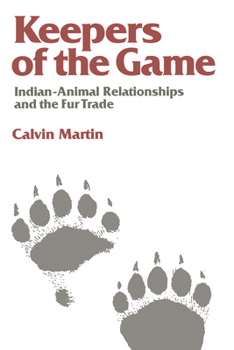Keepers of the Game: Indian-Animal Relationships and the Fur Trade
Select Format
Select Condition 
Book Overview
Examines the effects of European contact and the fur trade on the relationship between Indians and animals in eastern Canada, from Lake Winnipeg to the Canadian Maritimes, focusing primarily on the Ojibwa, Cree, Montagnais-Naskapi, and Micmac tribes.
Format:Paperback
Language:English
ISBN:0520046374
ISBN13:9780520046375
Release Date:April 1982
Publisher:University of California Press
Length:240 Pages
Weight:0.58 lbs.
Dimensions:0.6" x 5.5" x 8.2"
Customer Reviews
4 ratings
Keepers of the Game
Published by Thriftbooks.com User , 15 years ago
With a firm gentleness, Calvin Martin, insightfully describes the reciprocity and repercussions of our animal bonds and the breaking of those bonds. The accumulation of well documented 'firm gentleness' statements delivers a hard hitting viewpoint that has stunned me. The notes are a priceless resource.
Great Story!
Published by Thriftbooks.com User , 19 years ago
Martin has done a remarkable job of telling a very difficult story of the inter-relationships between the first people of Canada, the new world order people of European ancestry and the animals. I am Mi'maq and reading the history took be back to a time and an appreciation of what was a part of life. My hats off to Martin for telling a story that needed to be told!
Great read for many reasons
Published by Thriftbooks.com User , 20 years ago
This book is a great read for many reasons. One that may not get mentioned, but strikes me as important, is the demonstration of how social rules and the environment relate to economic markets. In short: the relationship of the native North American tribes to the fur markets was conditioned by their culture which went through a sudden, tragic, transformation.
A different view of Native-European contact
Published by Thriftbooks.com User , 23 years ago
Scholarly works are not supposed to entertain but Martin's interesting ideas about the cultural confrontation between the First People and the first Europeans makes for fascinating reading. He challenges several accepted views about Native population decline resulting from disease and warfare which are sure to spark disagreement; yet his logic is difficult to refute and the perspectives he offers provide new directions for research. Martin manages to avoid casting anyone into the roles of oppressor and victim by presenting the sequence of events as the result of rational decisions by both cultural groups. While anthropologists and sociologists will certainly find "Keepers" of interest, anyone who teaches cultural diversity or provides diversity training will also benefit from this work. General readers will enjoy asking themselves if their ancestors could have been involved in the events Martin describes.





